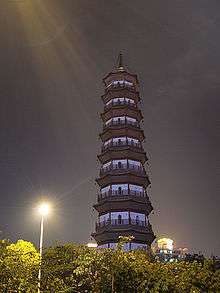Chigang Pagoda
| Chigang Pagoda | |||||||||||
 | |||||||||||
| Chinese | 赤岗塔 | ||||||||||
|---|---|---|---|---|---|---|---|---|---|---|---|
| Literal meaning | Red Mound Pagoda | ||||||||||
| |||||||||||
Chigang Pagoda is a famous pagoda located in Haizhu District, Guangzhou, China.[1]
History
Chigang Pagoda was built in 1619, during the reign of the Wanli Emperor of the Ming dynasty, at a time when fengshui influences were pervasive in Chinese architecture. Together with the Pazhou Pagoda and Lotus Pagoda, it is said that the three pagodas were built at the mouth of the Pearl River to bring good luck to Guangzhou and the surrounding area.[2]
The building is made from red sandstone.[3] The style of the Chigang Pagoda is influenced by the Ming dynasty architecture of the era. It was built to mirror the Pazhou Pagodain the vicinity as well.[3]
Architecture
The tower is built in an octagonal shape. It stands 53.7 meters (176 ft) tall. The base has a diameter of 12.5 meters (41 ft). The tower has nine exterior floor sections.[3] Inside the tower, it consist of 17 levels which keeps the nine sections together.[3]

Restoration
Because of neglect and exposure to the elements over the centuries, the Chigang Pagoda deteriorated. The external wall cracked, the foundation started to sink, and the floors became uneven due to neglect. At one stage, the tower leaned about 1.05 m from the vertical.[3]
In 1996 the Guangzhou authorities started work on its restoration, but this was never completed due to a lack of funds.[3][4] In 1998 the Guangzhou Municipal Cultural Relics Management raised RMB 1.60 million to fund restoration of the Pagoda.[3][4] The restoration and inspection was completed in mid-1999.[3][4]
Transport
The pagoda can be reached by rail. It is near Canton Tower Station (previously called Chigang Pagoda Station) on line 3 and Kecun Station on line 3 and line 8 of the Guangzhou Metro. However, the pagoda is not open to the public.
References
- ↑ "Archived copy". Archived from the original on 2011-05-24. Retrieved 2011-01-13.
- ↑ http://www.hudong.com/wiki/%E8%B5%A4%E5%B2%97%E5%A1%94
- 1 2 3 4 5 6 7 8 http://baike.baidu.com/view/1704685.htm
- 1 2 3 http://old.lvyou100.com/Scene/jdindex/4323.html[]
Coordinates: 23°6′15.6″N 113°19′2.3″E / 23.104333°N 113.317306°E
